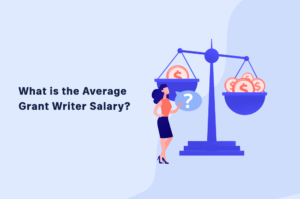In this guide, I’ll break down responsibilities, the grant writing process, required skills, salary ranges, learning resources, and the career paths I see most often.
Grant writing in real life is part writing, part research, part project management, and part “did we follow every instruction exactly?”
Grant Writer Responsibilities
Grant writers do more than write. A lot of the job is making sure the right information exists, is organized, and shows up in the final application in the right format.
Here are the responsibilities you’ll see in most grant writer roles:
- Research funding opportunities and funders that match the organization’s mission and eligibility requirements.
- Confirm fit before writing, including alignment with program goals, eligibility requirements, allowable costs, and submission deadlines.
- Draft core application sections like the executive summary, statement of need, project description, proposal narrative, project objectives, and evaluation plan.
- Coordinate supplementary application materials like budgets, letters of support, resumes, proof of nonprofit status, logic models, and attachments.
- Build and manage the submission plan, including internal deadlines, reviewer cycles, approvals, and upload requirements in grant submission programs.
- Support post-award work such as progress reports, outcome tracking, and documentation for grant-funded projects.
A good grant writer also becomes a translator between stakeholders. You’re turning program vision into funder language, and you’re turning funder requirements into clear instructions for internal teams.
The Grant Writing Process
Grant writing gets much easier once you stop treating it like a one-time writing sprint and start treating it like a repeatable workflow.
Here’s the step-by-step process I recommend.
Look for alignment between the funder’s priorities and your program. This is where you verify eligibility requirements and avoid wasting weeks on a low-fit application.
Stakeholder kickoff
Pull in the people who own the program, the budget, and the outcomes. Confirm project objectives, timeline, and the evidence you will use to support the statement of need.
Build the application map
Create a simple outline that mirrors the grant guidelines. I like to build a checklist of every question, every required attachment, and every formatting rule.
Draft the narrative
Write the executive summary last, not first. Start with the project description and proposal narrative, then layer in the story that ties the entire application together.
Budget and budget narrative
This is where many strong proposals fall apart. The budget must match the narrative, the timeline, and the staffing plan. If the numbers contradict the story, reviewers notice.
Editing and revision
Edit for clarity and tightness, then revise for compliance with grant guidelines. Those are two different passes, and combining them usually leads to misses.
Assemble supportive documents
Letters of support, proof of partnerships, evaluation plan details, and any required forms should be collected early, not on the last day.
Final quality checks and submission
Do a final check for eligibility requirements, formatting rules, page limits, file naming, and upload instructions. Then submit early if possible, because portals fail at the worst times.
If you want a more detailed walkthrough, use the guide on the grant writing process in 8 steps.
Required Skills and Qualifications
Grant writing is one of those careers where the “soft skills” are not soft at all. They’re operational skills that keep projects moving.
Here are the skills that matter most.
Written communication
Clear writing wins, but grant writing is a specific style. You need to write to the funder’s priorities, not your organization’s internal vocabulary.
Research and critical thinking
You’ll evaluate funders, interpret requirements, and build arguments supported by evidence, not vibes.
Organization and time management
Deadlines, internal approvals, and attachments are half the job. Strong organizational skills prevent last-minute chaos.
Editing skills
You need to revise for clarity, strengthen the logic, and catch inconsistencies between the narrative and the budget.
Budgeting and financial planning basics
You do not need to be an accountant, but you need to understand how budgets work, how to justify costs, and how to avoid unrealistic line items.
Relationship-building and stakeholder management
You’ll work with program staff, leadership, finance, and external partners. Your ability to coordinate inputs will often determine the quality of the final submission.
Technological proficiency
Most grant writers live in shared drives, PDFs, portals, and submission systems. Comfort with collaborative tools is table stakes.
On the education side, many grant writers have a bachelor’s degree in English, communications, journalism, education, public policy, or a related field. That said, employers usually care more about proof of skill than the exact degree.
If you’re trying to build credibility fast, I’d also review the core skill breakdown here: essential grant writing skills.
Learning and Training Resources
There are two ways to learn grant writing.
You can learn by doing it inside an organization, or you can learn through structured training while you build samples on the side. Many people do both.
Here are the resources I point people to most often:
Courses and self-guided learning
First of all, I do honestly suggest our grant writing course if you’re looking for a beginner-friendly course that will teach you grant writing and also get you a certificate.

Training and certifications
An alternative is the Grant Professionals Association offers training and continuing education, including programs like Next Level Grant Training and membership-based learning options.
If you want a professional credential, the Grant Professionals Certification Institute administers the Grant Professional Certified credential.
Tools for grant research
For nonprofit funder research, a common tool is Candid Foundation Directory, which helps you research grantmakers and funding history.
For federal opportunities, Grants.gov is the central platform for posted federal funding opportunities for organizations.
Grant management software
If you’re managing multiple deadlines and applications, grant management tools can help. One commonly used option is GrantHub (pre-award tracking and workflow).
Salary and Compensation
Grant writer pay varies widely based on geography, industry, seniority, and whether you’re in-house, agency, or freelance.
To give you a realistic picture, here are a few market snapshots from late 2025 and early 2026:
Indeed grant writer salary reports an average grant writer salary in the U.S. around $63,918 per year based on job posting data.
ZipRecruiter lists an average around $66,107 per year.
PayScale reports an average around $57,386 for grant writers, with breakdowns by experience and location.https://www.ziprecruiter.com/Salaries/Grant-Writer-Salary
What tends to increase earning potential:
- Experience with complex funders (federal, state, large foundations).
- Ability to manage the full lifecycle, including reporting and compliance.
- A track record of wins and a portfolio you can discuss confidently.
- Specialization in a domain like healthcare, education, environment, workforce development, or public policy.
Freelance or consulting rates can be higher than salary roles, but they come with business development work and variable income.
Social Impact and Value
Grant writing is one of the few writing careers where the impact is often direct and measurable.
A strong grant proposal can fund:
- Advocacy groups and social services programs.
- Arts and cultural institutions.
- Community development and workforce training.
- Environmental and conservation projects.
- Healthcare organizations and public health initiatives.
- Education programs, research labs, and libraries.
When you do this work well, you’re not just “getting money.” You’re helping an organization turn a mission into operating revenue, and you’re helping funders distribute resources to programs that actually execute.
That’s why grant writing tends to attract people who want a career that feels useful. It’s also why the deadlines and pressure can feel intense. The stakes are real.
Career Path and Opportunities
Grant writing has a few common career paths, and you can move between them as your life changes.
- Nonprofit in-house grant writer: You work for a single organization and build deep knowledge of their programs, outcomes, and partnerships.
- Government agencies and public institutions: You may write and manage grant submissions and reporting for education, public health, infrastructure, and research programs.
- Grant writing consultant businesses: You support multiple clients and often specialize by sector. Consulting can pay well, but you also become a business owner.
- Self-employed or freelance grant writer: Similar to consulting, but often with more flexible scope and more emphasis on your personal pipeline and referrals.
- Career change or career switch into grant writing: This is common. People come from journalism, education, communications, fundraising, technical writing, or program management.
If you’re starting from zero experience, the fastest path I’ve seen looks like this:
- Start with volunteer work or a low-risk internal project so you can build real samples.
- Learn one funder ecosystem deeply instead of trying to learn everything at once.
- Create a simple portfolio with sanitized sections, outlines, budgets, and before-and-after rewrites.
- Update your resume and LinkedIn so your experience reads like grant work, not just “writing.”
For practical next steps, use these guides:
Closing Thoughts
Grant writing is a great career if you like structured writing, research, collaboration, and the satisfaction of helping real programs get funded.
It’s also not “just writing.” It’s requirements, stakeholders, budgets, timelines, and a lot of careful revision.
If you want to start strong, do this one thing: pick one real opportunity, build an outline that matches the guidelines exactly, and draft a clean narrative that ties the need, the plan, and the outcomes together. That single exercise teaches you more than ten blog posts.
FAQ
Here are the most frequently asked questions about grant writers.
What is a grant writer?
A grant writer researches funding opportunities and writes grant proposals to help organizations secure funding from government agencies, foundations, and other funding organizations. Many roles also support budgets, attachments, and post-award reporting.
What does a grant writer do day to day?
Day to day work usually includes grant research, interpreting grant guidelines, drafting proposal narrative sections, coordinating supplementary application materials like letters of support, managing deadlines, and revising drafts based on stakeholder feedback.
Do I need a degree to become a grant writer?
A degree is common, especially in English, communications, journalism, education, or public policy, but it’s not always required. Employers care most about writing skill, attention to detail, and proof you can follow guidelines and manage submissions.
How do I learn grant writing?
You can learn through on-the-job training, volunteer work, online courses, and professional associations. Many grant writers also use structured programs like grant writing certification to build skills and a portfolio faster.
What tools do grant writers use?
Common tools include grant research platforms like Candid’s Foundation Directory, federal opportunity portals like Grants.gov, collaborative writing tools, and grant tracking software like GrantHub.
How much do grant writers make?
Pay varies by employer type, location, and experience. Recent market snapshots show averages in the roughly $55k to $66k range, depending on the data source, with higher earning potential for senior roles, specialized sectors, and consulting or freelance work.
If you’re new to grant writing and looking to break in, we recommend taking our Grant Writing Certification Course. In it, you will learn the fundamentals of grant writing, how to dominate grant writer interviews, and how to stand out as a grant writer candidate.













